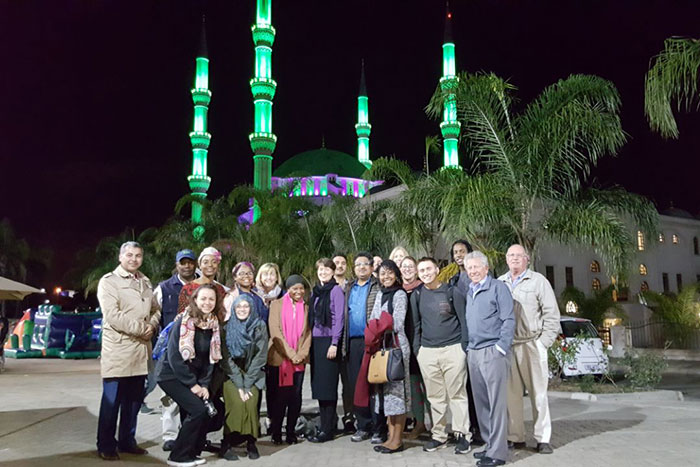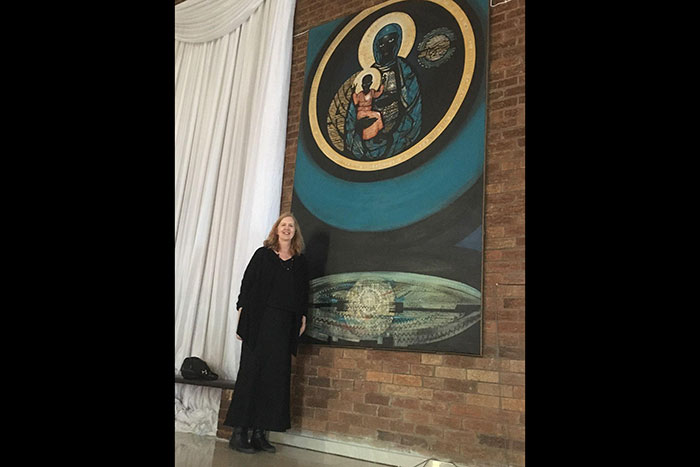“In our language there is a saying, Ndiwelimilambo enamagama — I have crossed famous rivers. It means that one has travelled and, in the process, gained much experience.” — Nelson Mandela, “Nelson Mandela: By Himself.”
As South Africa grapples with a post-apartheid identity, the transition hasn’t come without significant cultural, racial and economic growing pains, presenting an ongoing study in the struggle for justice.
Those complexities also make it a unique classroom, says Lisa Garvin, associate dean of the chapel and religious life at Emory.
So when Garvin began researching a destination for Emory’s 2018 Journeys of Reconciliation trip, it wasn’t hard to find strong parallels between ongoing conflicts within South Africa and similar challenges being faced right here in the U.S.
“We had been in South Africa before — it was a trip we knew,” says Garvin. “But as we were planning this year’s trip, at the same time conversations about Confederate monuments were coming up around the United States.”
Garvin joined forces with Pamela Scully, vice provost for undergraduate education and a professor of African studies and women’s, gender and sexuality studies, who grew up South Africa. The pair decided to build upon those commonalities, framing the trip with a special focus on race, memorials and reconciliation.
Not only did the focus demand thoughtful questions about who is memorialized and why, it fit within Emory’s ongoing conversations around racial and social justice, says Garvin. And the sheer timeliness was evident by the applications that poured in to attend — three times the number of applicants for past years’ trips.
That’s how a group of 17 Emory students, faculty, staff and alumni set out to explore a nation of breathtaking natural beauty that still bears the scars of apartheid — a country reckoning with a painful past while striving to define its future.
Search for healing, reconciliation
Organized by the Office of Spiritual and Religious Life, Journeys of Reconciliation is an inter-religious immersion program that explores the root causes of conflict while building relationships between Emory communities in the U.S. and around the world.
The program seeks participants with diverse backgrounds and scholarly interests to encounter communities and explore the world’s complexities. Previous destinations have included Cuba, Bosnia, Mexico, the Middle East and Northern Ireland, as well as Arizona and Mississippi. This year’s journey took place May 16-28.
In addition to completing assigned readings, participants took turns writing about their experiences in an online travel blog, from the first day’s visit to a museum tracing the origins of humans — created after apartheid to help recreate a history largely erased or distorted — to final reflections on healing and reconciliation across generations.
Highlights included visits to Robben Island, with a guide who spoke about his own time in the island prison along with Nelson Mandela; visiting with people who lived through the violence of apartheid and those who worked with the post-apartheid Truth and Reconciliation Commission; and an interactive theater program at a museum that underscored the injustice of the apartheid pass law system and the passes, or “dompas,” which all Africans were once required to carry.
Beyond museums, a safari and transforming conversations, there were especially meaningful moments. A visit to the Regina Mundi Church in Soweto offered the chance to view a famous painting, “The Madonna and Child of Soweto,” which depicts a dark-skinned Virgin Mary carrying a black child.
The artist? Larry Scully, Pamela Scully’s late father.
Blog entries describe how the racial separation of South African neighborhoods created a geography of social and economic injustice, and explore the generational tension that simmers between anti-apartheid activists and modern-day activists — also called the “born-free generation” — who criticize the slow pace of change and lingering injustices.
“One of the biggest parallels I saw was the rift between generations, which also happens in the black American experience,” says Bobbye Hampton, a rising Emory senior double-majoring in human health and African American studies.
“Many of the people living and fighting during apartheid have a different way of viewing things than the born-free generation, which was very similar to how a lot of older folks in the American civil rights movement view youth activism today,” she explains.
Hampton says she was drawn to the trip, in part, by a yearning to visit the continent of her ancestors, though she knows little about where they originated.
So she was especially moved during a visit to St. John’s Church, when Pastor Maake Masango conducted a naming ceremony, providing his black visitors with true African names to fully welcome them home.
“Not knowing where I come from on the continent, being able to connect as brothers and sisters that way was an incredibly emotional experience,” says Hampton, who was given the name “Lerato,” which means love in Sesotho.
Moments of reflection, growth
Even in post-apartheid South Africa, the past remains very much present, says Scully, who earned her undergraduate and master’s degrees from the University of Cape Town, and was active in the anti-apartheid movement.
And she was pleased to help guide the Emory group through a landscape that is both familiar and rapidly changing.
“Our group was absolutely fantastic — very cohesive and willing to take on difficult conversations,” reflects Scully. “I think we all came away with a deeper realization of the complexities of the 21st century and the commonalities between South Africa and the United States in ways we had not thought of before.”
During the waning days of the trip, Scully recalls a visit to Bo-Kaap, a historic racially mixed district in the center of Cape Town, where the group witnessed a public protest about gentrification, as growing interest from local and international elites in the neighborhood — with its lovely views and location — and climbing real estate prices are forcing residents to sell homes that have been in families for generations
“It resonated so profoundly with all of us in Atlanta, which is experiencing similar dynamics,” Scully says. “An imam told us, ‘We survived apartheid, but we are not surviving democracy.’ That’s largely because of the power of money and gentrification.”
“I think we came to see South Africa as no longer the promised land, but one still struggling with access to education and wealth, frightful inequalities and racism,” she says.
Garvin says the experience offered moments of deep reflection and growth for everyone.
“How do we carry the baton of those who brought down apartheid structures in South Africa and who led the civil rights movement in the U.S., while acknowledging the deep injustices that still exist? What can we do today to carry us toward justice?” she says.
“Many of us think that the U.S. and South Africa have made such great progress, which is true in many ways,” Garvin adds. “But we also have a long, long way to go. Those are the questions we must answer moving forward.”
The 2019 Journeys of Reconciliation trip destination will be announced in September. For more information on the program or how to join in the trip, visit here.


